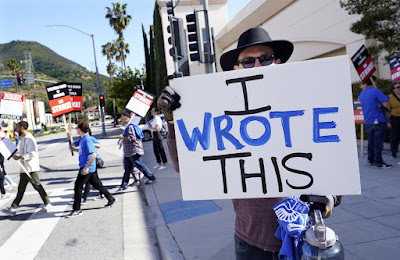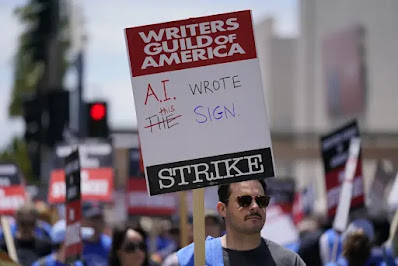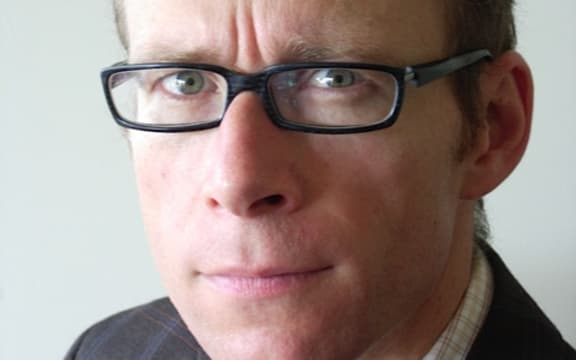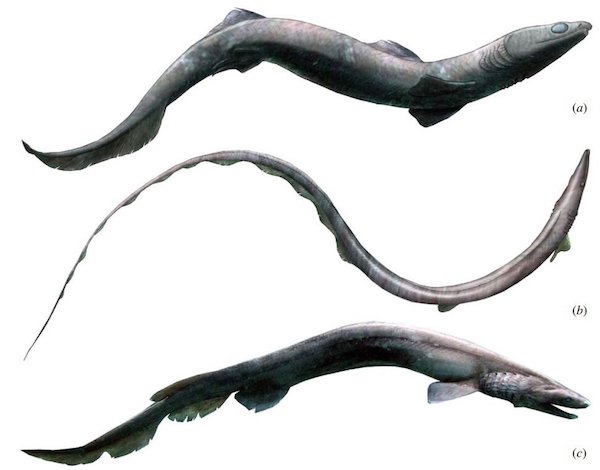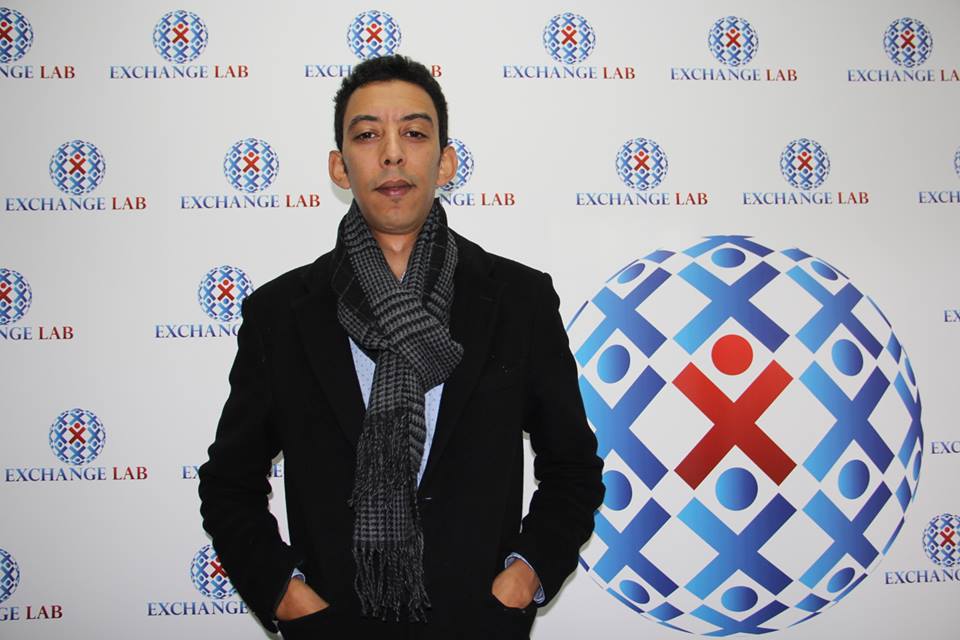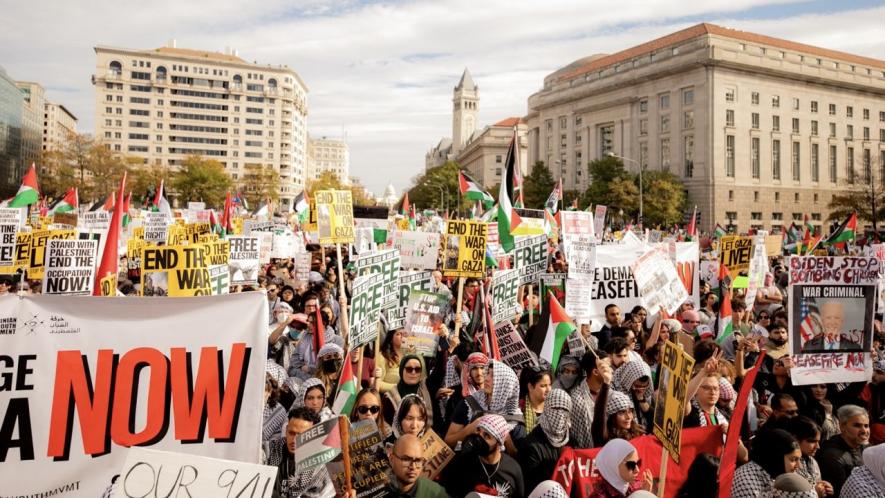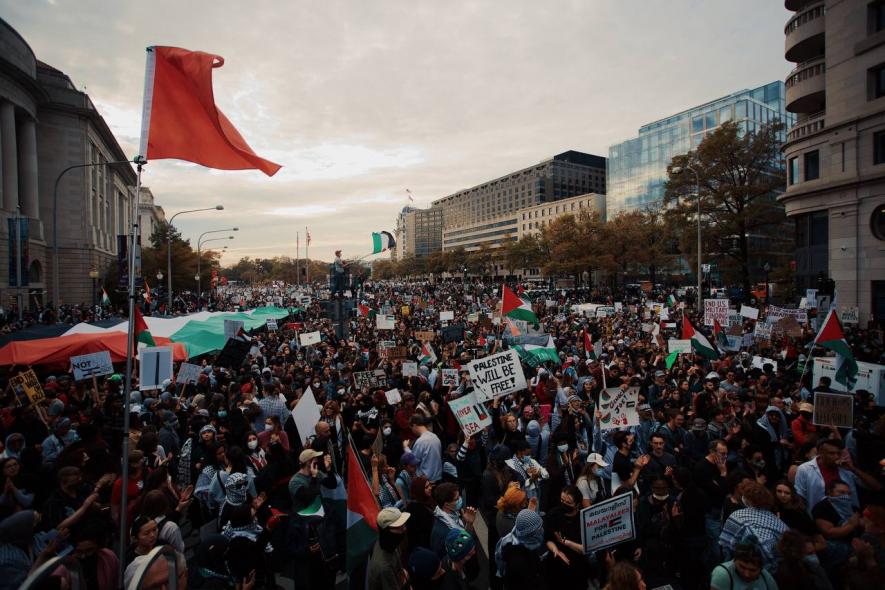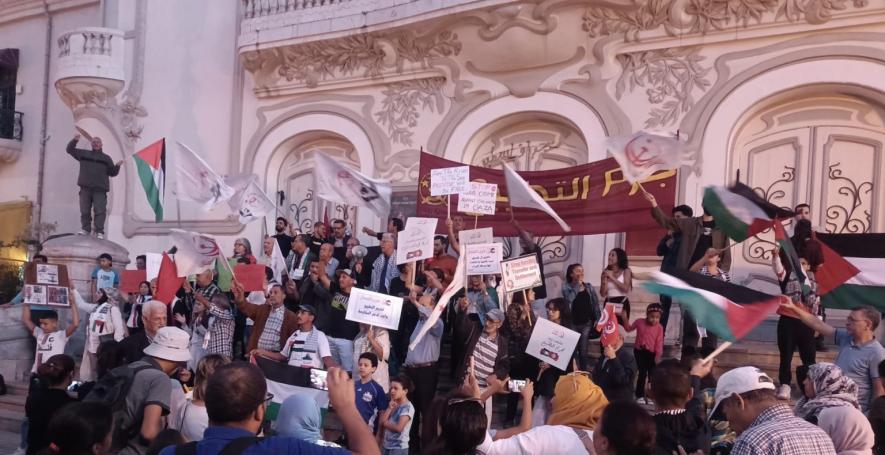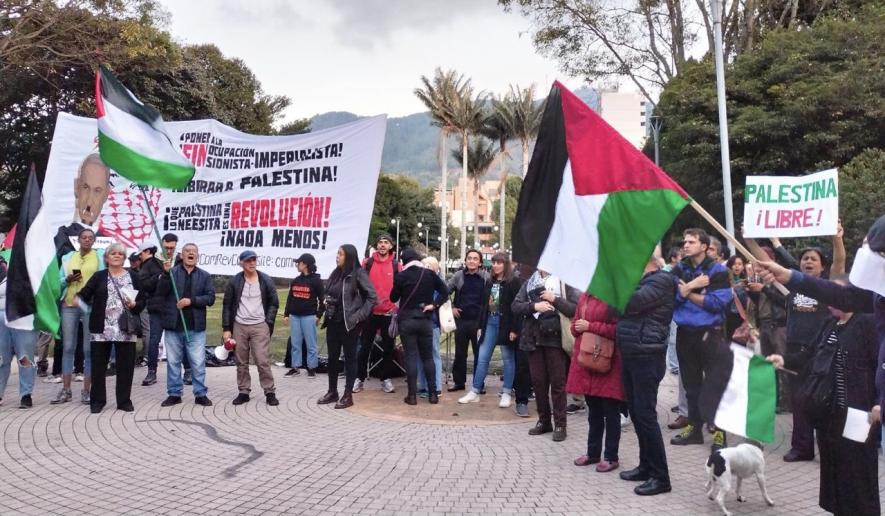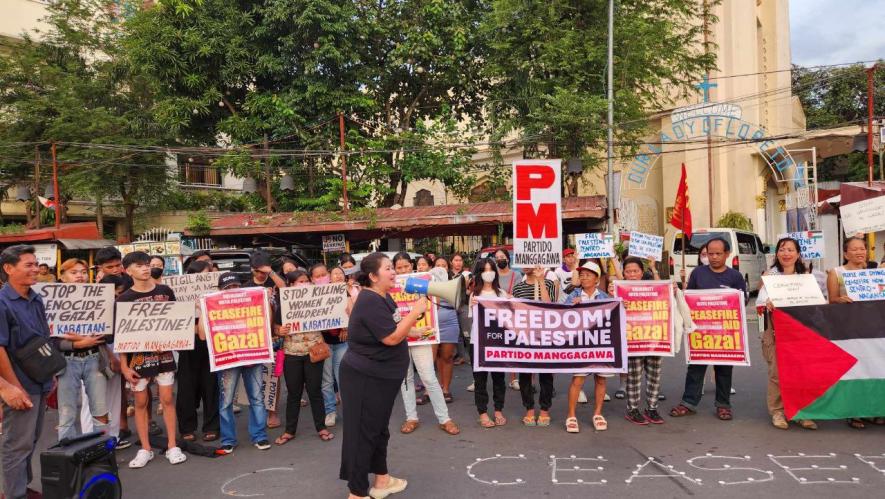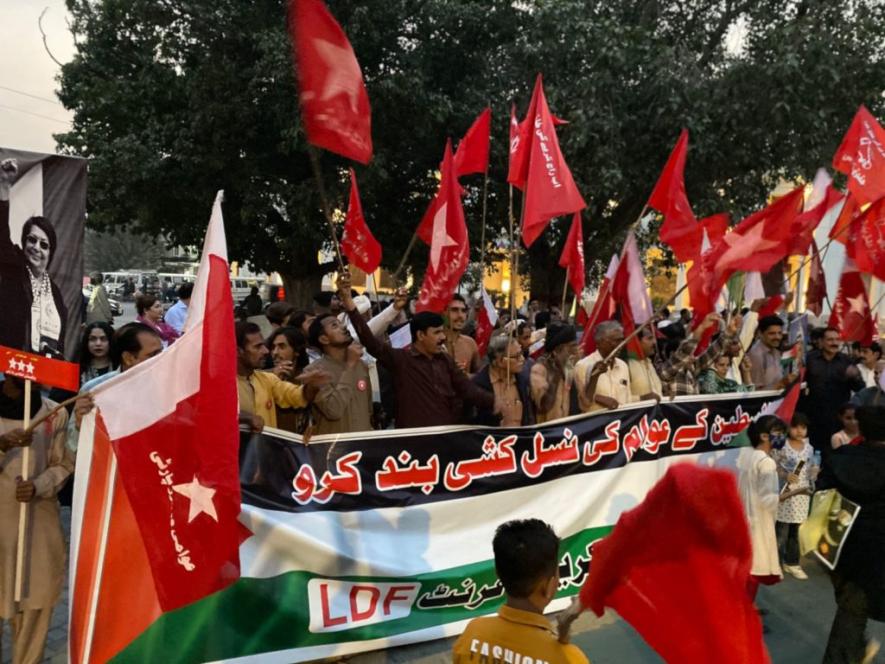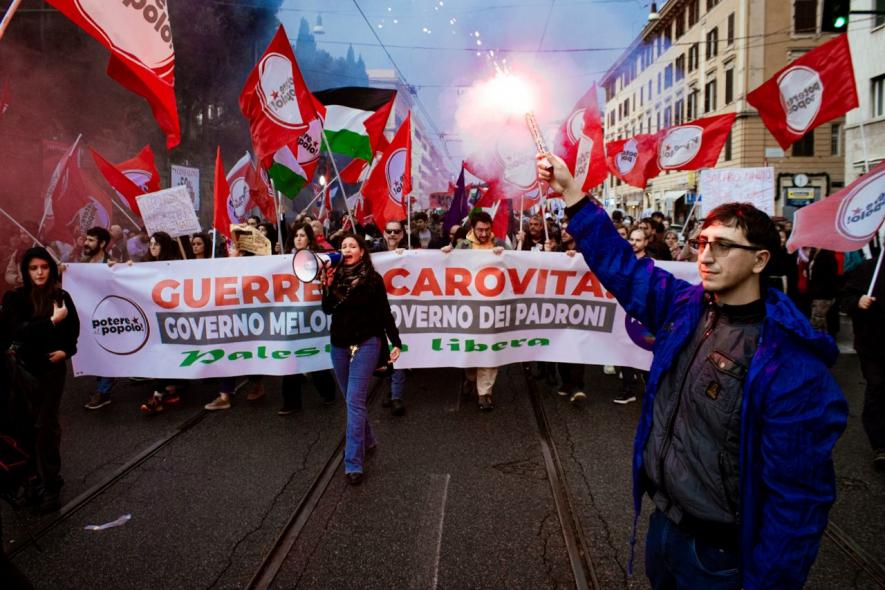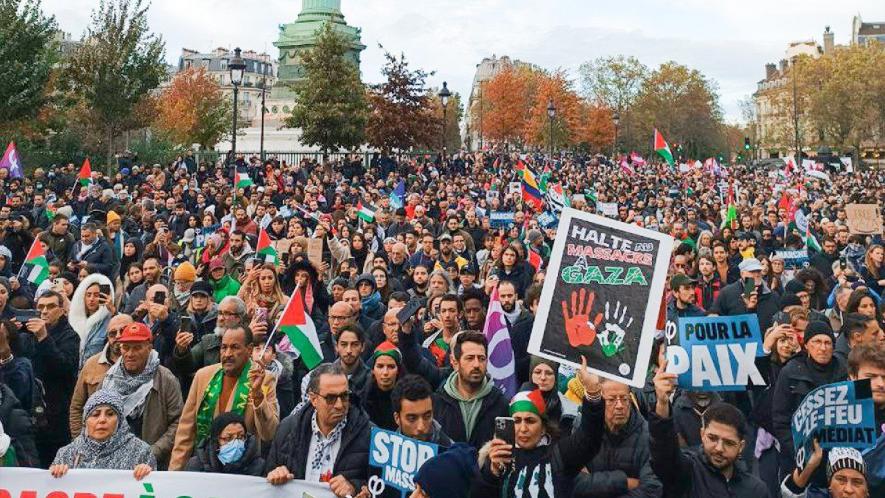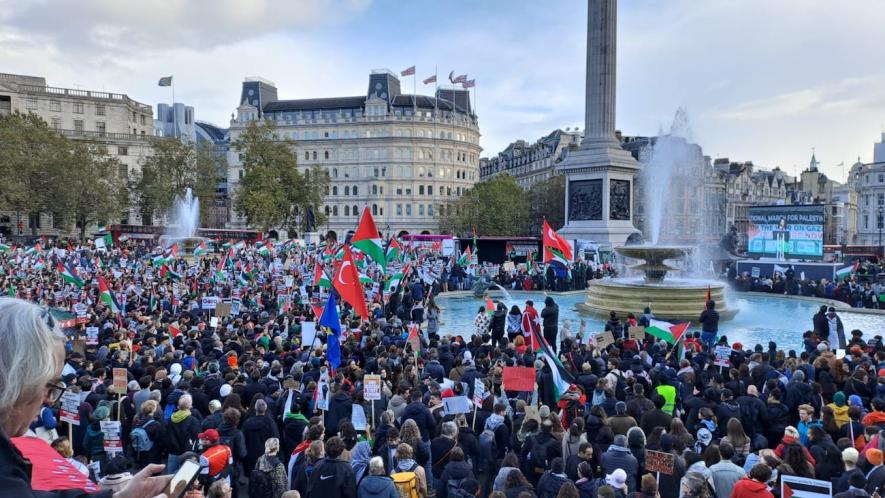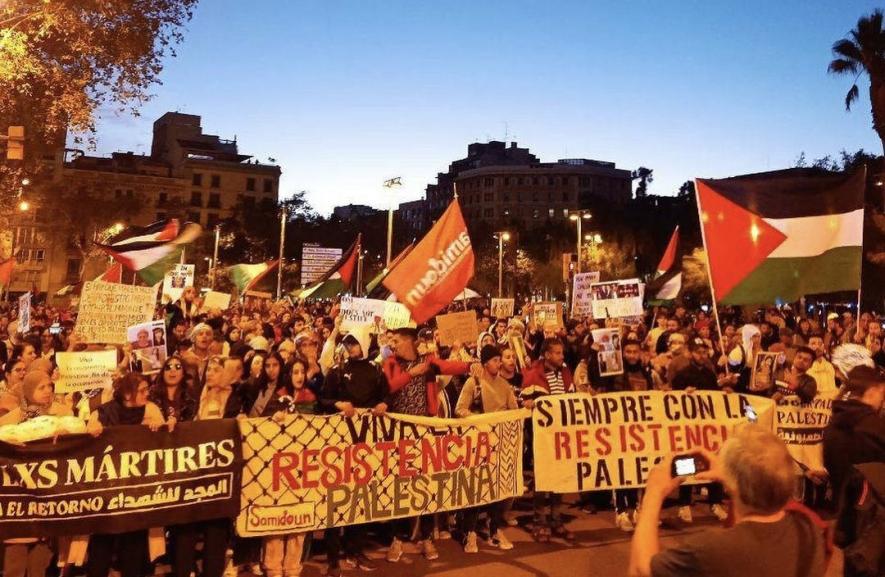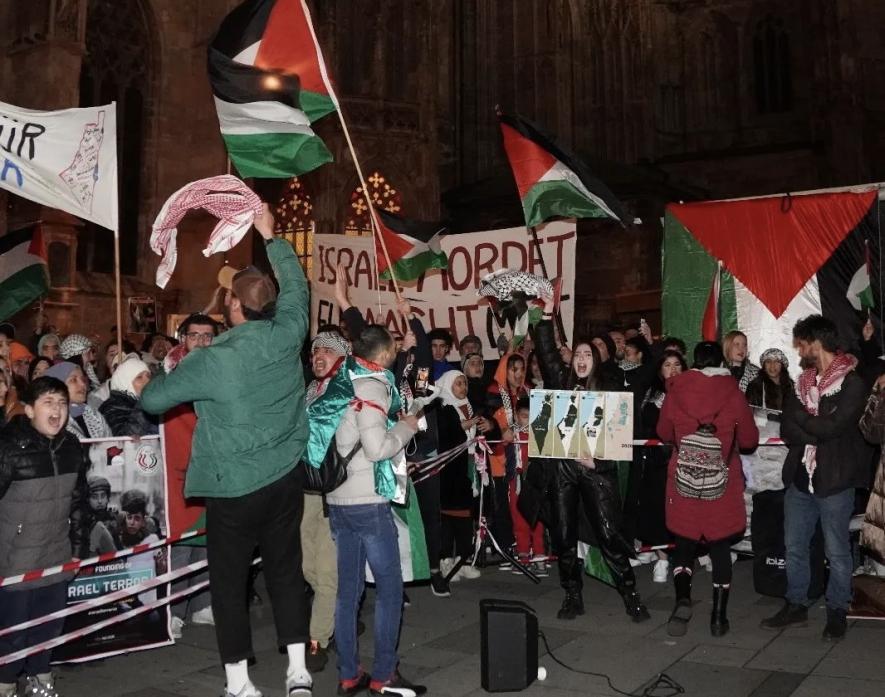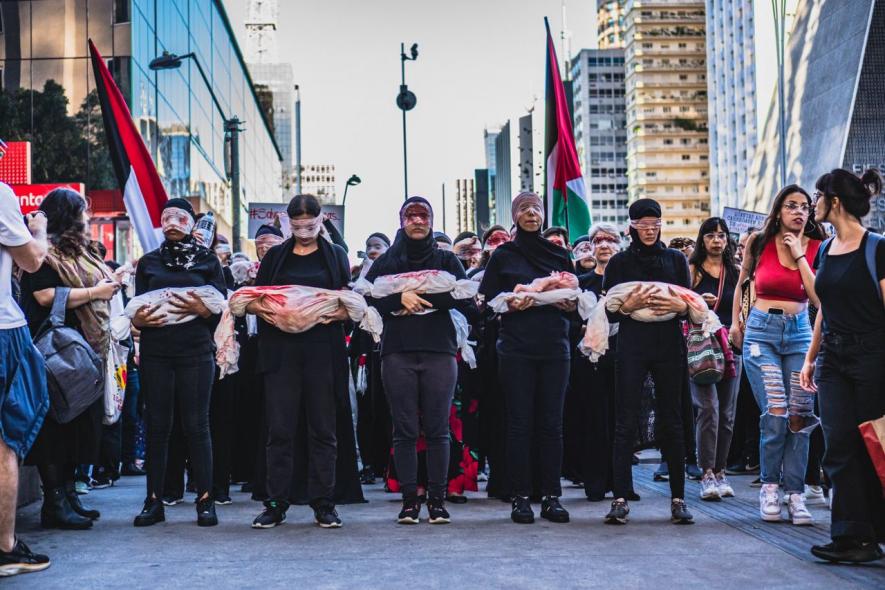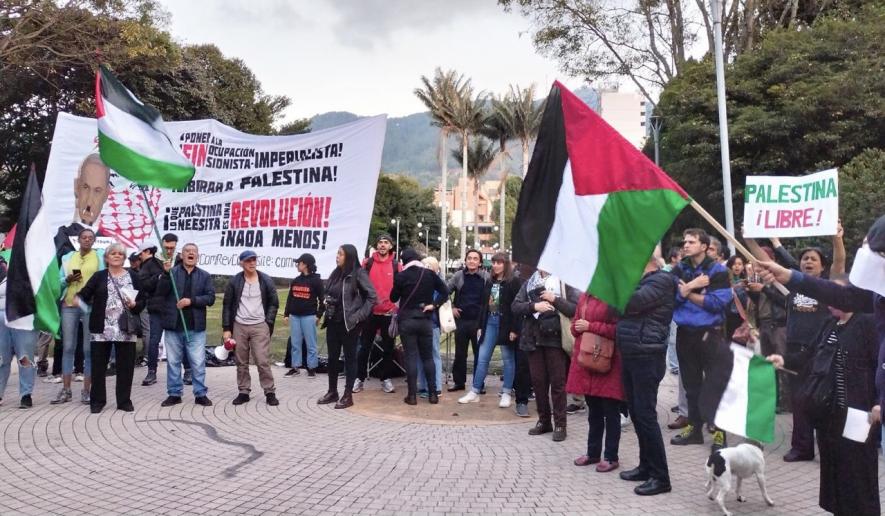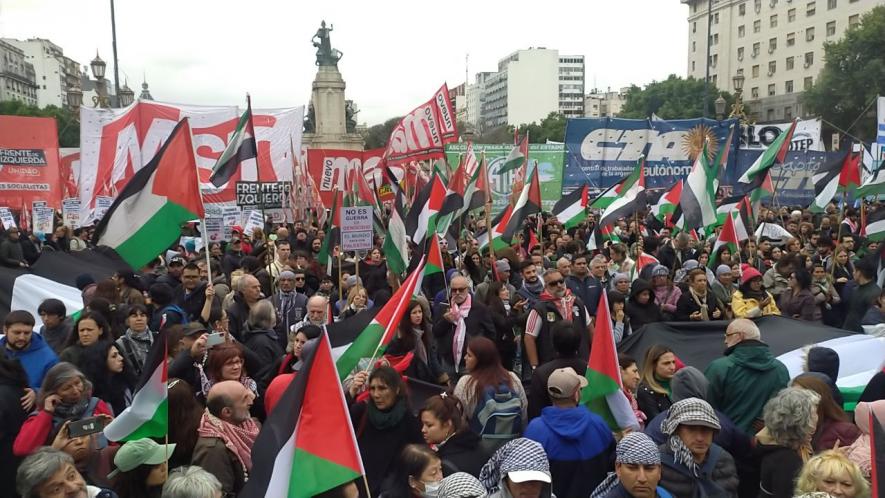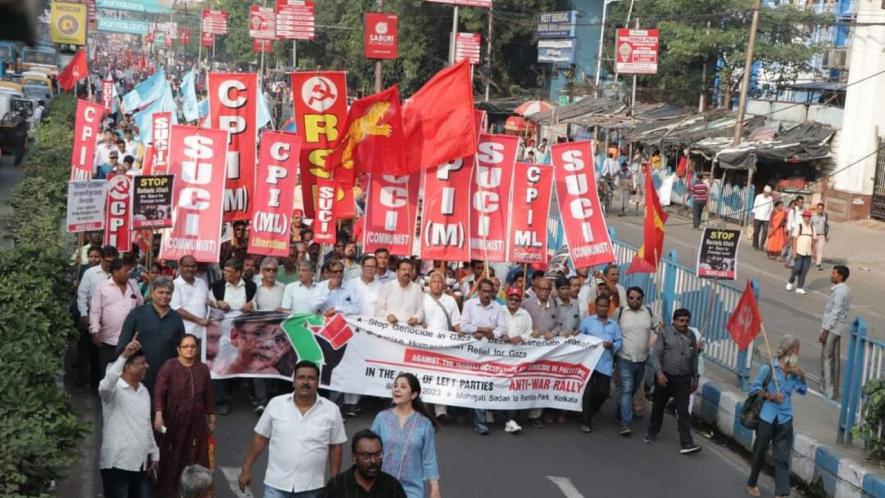Protests and demonstrations were also held across Europe on Saturday. In Italy, more than 10,000 people gathered in Rome for a national demonstration organized by the left-wing Power to the People (PaP) party and joined by various civil society groups, unions, and political parties to demand a ceasefire in Gaza, for an end to the Israeli apartheid regime and the occupation of Palestine.
Protesters further called for the revocation of the military cooperation agreement between Italy and Israel, and for Israeli Prime Minister Benjamin Netanyahu to be tried at the International Criminal Court. The protest action also raised broader issues including an end to the supply of arms for the proxy war in Ukraine, and for cuts to military spending to expand social expenses.
Protest for Palestine in Rome. Photo: Potere al Popolo
Around 10,000 people also gathered in the city of Milan to demand a ceasefire in Gaza and in solidarity with the Palestinian people.
On November 6, students part of the Self-Organized University Collective (CAU) at the L’Orientale University of Naples occupied the Palazzo Giusso building in solidarity with the Palestinian people.
“For almost a month, in Gaza, in the silence and complicity of Western governments, primarily the Italian one, a genocide perpetrated against the Palestinian population has been taking place.
“If the institutions and the media have demonstrated a clear desire to cover up the war crimes for which the Israeli government is responsible, it is urgent and necessary that a response in solidarity with the Palestinian people starts from the bottom, from us students who do not want to remain in silence in the face of all this,” the Collective said in a statement.
Demonstrations were held across France on Friday organized by 100 trade unions, political parties, and civil society organizations, including the General Confederation of Labor (CGT) and La France Insoumise as part of the “National Collective for a Just and Lasting Peace between Palestine and Israelis”.
According to LFI, 60,000 people gathered for the demonstration in Paris. The demands raised during the protests included an immediate ceasefire in Gaza, an end to bombings and forced displacement of the Palestinian population, immediate lifting of the blockade, protection of the Palestinian people in Gaza and the West Bank. The collective also called for the “construction of a just and lasting peace in Palestine, in accordance with UN resolutions so that the rights of the Palestinians are finally recognized”.
“This is an absolutely appalling massacre that is in place and is being organized by Mr. Netanyahu in a methodical and not at all improvised way.” said LFI leader Jean-Luc Mélenchon. He further condemned the French government’s call for a “humanitarian truce” — “Why talk about a humanitarian truce? What does that mean? Who will decide the start and especially the end of the truce?” — and called for an immediate ceasefire.
Mobilization in Paris for Palestine.
Demonstrations were similarly organized in communes throughout the country, including Épinal, Brioude, Saint-Claude, Albi, as well as several cities including Grenoble, Lille, Montpellier, Saint-Étienne, Lyon, Toulouse, Rouen, Nantes, Strasbourg, and Marseille, among others.
Thousands of people also took to the streets in a fresh day of protests in Berlin on November 4, resolutely defying an increasingly hostile government that has criminalized solidarity with Palestine.
Meanwhile, hundreds of thousands of people also took to the streets across the UK for a “Day of Action – Ceasefire Now!” organized by groups including the Palestine Solidarity Campaign. Saturday’s protests were organized at the local level ahead of a national mobilization set to take place on November 11.
In one of the biggest protests on November 4, 40,000 people gathered at Trafalgar Square in London to demand a ceasefire in Gaza. The names and ages of all Palestinian children killed by Israel were read out during the gathering, and the photos of the children were also displayed in tribute.
London for Palestine. Photo: PSC
Protests also took place in Bristol, Luton, Harrow, Newcastle, Leeds, York, Durham, and Cambridge. 20,000 people also marched through Manchester, with several thousand occupying the Piccadilly railway station.
“This is not just for the ongoing abominable genocide in Gaza…The massive mobilizations…are for the 75 years of Israel’s settler colonization of Palestine, brutal occupations, ethnically cleansing Palestinians, imprisoning them and mass murdering them,” said Adie Mormech of the Manchester Palestine Action, a direct action protest network.
“Palestine will always stand, and we won’t stop till they’re free,” he added, as quoted by the Morning Star.
Thousands of people also marched in the streets in Scotland, in actions organized in places including Aberdeen, Dundee, Dunfermilne, Glasgow and Edinburgh— where protesters took over the Central Station and the Waverly Station respectively in massive shows of solidarity.
Protests and solidarity actions were also organized across other parts of Europe, including in Bucharest in Romania and as well as in Spain including in Valencia and in Zaragoza, where the Communist Party of Spain organized a protest to demand an immediate end to all hostilities and the blockade of Gaza, for the Spanish state to recognize Palestine, and for the “return of all the territory to the Palestinian people”.
Thousands of people also joined the demonstration called by the Samidoun Palestinian Prisoner Solidarity Network in Barcelona on November 4 to demand “the end of the genocide, the massacres, and the impunity of the Zionist regime”, “to free all prisoners being held in Zionist prisoners”, and to “free Palestine from the River to the Sea”.
Photo: @samidoun.esp/Instagram
Actions were held in Bern in Switzerland on November 4, as well as a major rally in Oslo in Norway the day prior. Palestine Solidarity Austria also joined actions in the country on November 5, including in Salzburg and Vienna. Protests had also been held in Vienna on November 4 by the Global South Alliance, as well as in Innsbruck.
Protest action in Vienna on November 5. Photo: @palaestinasolidaritaet.at/Instagram
Latin America and the Caribbean
In the Latin America and the Caribbean region, a major action was organized in the city of São Paulo in Brazil on November 4. It featured powerful scenes including blindfolded protesters carrying blood-stained shrouds— a reminder of the horrific images that have emerged from Gaza of parents holding their slain children.
São Paulo for Palestine. Photo: Maneco Magnesio Guimarães
A demonstration was also held in the Colombian capital of Bogotá, with people raising the flag of Palestine and bearing banners with the slogans calling for an end to the “Zionist-imperialist occupation” and “liberate Palestine!”
A demonstration and vigil for Palestine was also held in San Juan in Puerto Rico. “We witness Jabalya, we remember Jayuya”, read a protest sign, referencing the 1950 armed insurrection led by Nationalist Party against the US. During the vigil, prominent Puerto Rican activist, Tito Kayak, climbed a flagpole and removed the US flag and hoisted the Palestinian flag in its place.
Protests were also organized in Mexico, including in the city of Guadalajara on November 4, with hundreds of people marching in the streets demanding “a stop to the genocide in Gaza” and “Killing children is not self-defense”. Another protest was held by a group of more than 100 social organizations in Mexico City on November 6, with people painting the Palestinian flag outside the National Palace. Protesters demanded the breaking off of ties with Israel and raised the slogan “Netanyahu, fascist. You are a terrorist!”.
A protest was also held in Uruguay calling for an to the genocide in Gaza. Meanwhile, in Honduras, an action was held at the Camp Viva Berta, named after the slain Indigenous activist, in Tegucigalpa on November 2 by the National Network of Women Human Rigths Defenders in Honduras to denounce the genocide in Gaza and express their support for the Palestinian people.
“We regret the pseudo-pacifist speeches of those who speak of a conflict in order not to point out those who for decades have uprooted the grass, the water and the vital breath of the living being of this ancient land of Palestine.”
People also gathered in the streets of Buenos Aires on Friday November 3, bearing the Palestinian flag and raising banners that read “It is not a war, it is a genocide”. Protesters also demanded the expulsion of Israel’s national water company, Mekorot, from Argentina.
Buenos Aires rally for Palestine. Photo: Rafael Soriano
“Gaza resists. Palestine exists. An end to Zionist apartheid!” read a slogan during the march in the capital of Santiago in Chile. Thousands of people also gathered in the Venezuelan capital of Caracas on Saturday for a massive solidarity march, which was also attended by government officials, including Venezuelan Vice President Delcy Rodriguez.
“Palestinians are our brothers…Palestine, we are going to defend it as if it were Venezuela,” one protester stated.









